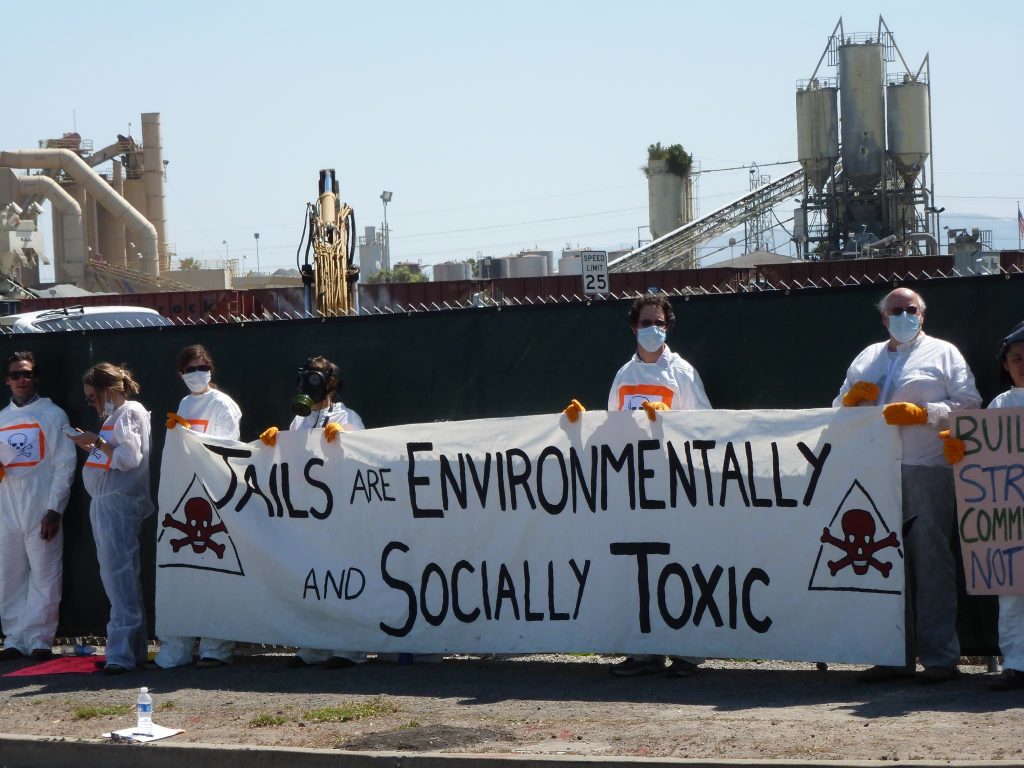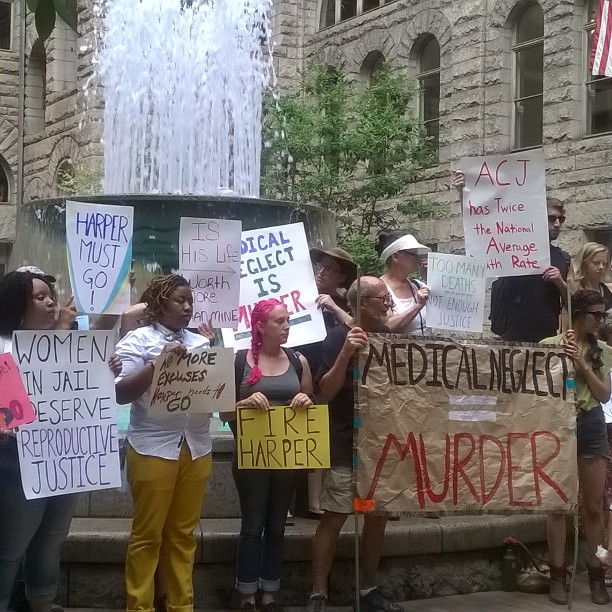
Health care is a human right — even for people who are locked behind bars in the worst part of society.
By Shandre Delaney
Editor’s note: Shandre Delaney is a prison abolitionist and Community Based News Room contributor. Her son, Carrington Keys, was released from prison on May 15, 2018, after serving 20 years. He spent 10 of those years in solitary confinement. Since then, Delaney has become a vocal advocate for her son and all prisoners.
I advocate for prisoners through the Human Rights Coalition Fed-Up! We believe that although prisoners lose their right to live in a free society, they do not lose their civil or human rights. We receive calls and letters from prisoners and their families daily. A large portion of the mail exposes inhumane medical conditions that amount to cruel and unusual punishment. What we are learning is quite alarming and an outrage.
In 2011, Allegheny County Jail in Pittsburgh had twice the death rate of the national average. Some of that is due to health care. To begin with, there is either substandard treatment or no treatment at all. Then, prisoners are charged a co-pay between $5 to $15 for this substandard care when they only make an average of about $20 a month from prison jobs.
Many prisoners are released just in time for life-saving treatment or surgery. Sad to say, but many die not long after being released. Some would be deceased or incapacitated had they not made it home in time to get proper care.
Being incarcerated with pre-existing conditions can be a death sentence. Through anonymous sources, I learned that prisoners at Allegheny County Jail with HIV and diabetes were not receiving HIV medication or insulin dosages on time because there were not enough nurses to distribute what was needed in a timely manner. Some people with diabetes were not given the correct insulin specific to their prescription because it was too expensive.
Medical Care in Pre-Trial Detention
At Allegheny County Jail in 2015, Frank “Bukit” Smart, within the first 24 hours of his arrest, was assaulted and killed by guards while having a seizure. The jail refused him access to seizure medication that he needed to take daily. The guards teased him when he asked to have family drop off his medication. After his death, his family and the community started the Bukit Bail Fund so others can be released immediately.
In pretrial detention, many with medical emergencies are ignored, like Carlos Gregario Hernandez Vasquez, the 16-year-old who died in ICE custody from the flu virus in May 2019. Or Tammy Jackson or Diana Sanchez, who both gave birth alone in their jail cells after repeatedly asking for help.
Some prisoners are taken to outside hospitals, usually after they are at death’s door, only to be hurried back to the prison. Rarely do they receive follow-up care.
The medical situation in immigrant detention centers mirrors that of prisons and jails. A Homeland Security ICE Whistleblower Report from March 2018 reveals preventable surgeries, deaths, detainees getting the wrong medicine and many other medical horrors. In 2019, there were daily reports of flu outbreaks and protests for immigrants to receive the flu vaccine at facilities along the border. The Department of Homeland Security denied the shots for a number of reasons. It claimed that due to laws put in place by the current administration, many refugees are being sent back to Mexico to await their immigration decisions, while others are sent to long-term facilities in the United States that would provide the vaccine.
Why Are Prisoners Getting Sick?
A number of incarcerated people have contracted life-threatening or chronic illnesses like cancer and Hepatitis C. Data shows prisoners are more likely to have chronic conditions or infectious diseases than their counterparts on the outside. Hypertension and diabetes are common in prisoners. The ratio of prisoners reporting diabetes in 2011–12 was 899 per 10,000 prisoners, nearly two times of reported cases in 2004 (483 per 10,000). With 2.2 million people incarcerated in the U.S. today, one of three have reported having Hepatitis C.

You have to wonder why prisoners are becoming sick? There are many obvious reasons to explore. What we put into our body can affect our health. Prison food is not expected to be five-star, but it is expected to be fit to eat. Recently, prisoners in Arizona sued the Department of Corrections because they were being fed meat that was labeled as not fit for human consumption. The prison version of “meat” is soy or a combination of fillers mixed with very little meat. According to Sally Fallon Morell of the Weston A. Price Foundation, “Excessive soy can be toxic to the thyroid gland and can have hormonal effects.”
A prisoner’s food choices are mess hall food that barely passes minimum dietary requirements or commissary, if you can afford it. Neither is a healthy alternative. Small portions force prisoners to buy from the commissary to supplement their meals. Commissary is usually provided by the same vendors who serve the mess hall meals. It seems to be a monopoly, and one where you are forced to buy commissary in order to sustain yourself. Commissary portions are usually smaller than consumer portions and always higher priced.
A prison’s goal is to cut costs and privatization leads to low-quality food. Two correctional food vendors are Aramark and Trinity. Both have been accused of serving contaminated and moldy food. Aramark has been accused of providing food with maggots in it. As if the prison food wasn’t bad enough, as punishment, some prisoners are given food loaf, which is supposed to be nutritious. But prisoners describe it as baked slop. The loaf is said to contain milk, rice, potatoes, carrots, cabbage, oatmeal, beans and margarine, and sometimes beef or chicken.

Prison is a toxic environment within itself, but hundreds of American prisons are built on land that was otherwise worthless due to its environmental hazards. This kind of land is popular in the industry because it can be purchased very cheaply. Pennsylvania’s SCI Fayette was built on one of the largest coal ash waste sites in the country. Prisoners’ medical symptoms were ignored until guards and city residents became ill. At SCI Forest, where my son was, there was a mold infestation. He went to sick call because he could not breathe and was told he had symptoms of mold infestation. When the prisoners began to complain, the prison covered it up by diagnosing everyone with allergies and giving them Zyrtec for their symptoms. My son, who has been home two years now, still has a cough, even though he is a non-smoker. In June 2019, prisoners and activists celebrated a victory for stopping the building of another prison on a toxic waste site in Letcher County, Kentucky.
Another issue is the brown water. Long before hearing about Flint, Michigan, my organization was receiving letters from prisoners about the brown water. My son once told me, “You have a choice between suicide or survival, because you have to drink water to live, but the water could kill you.”
These same toxic issues are found all over the country. The prisoners are forced to drink and shower in brown water, while the guards and dogs sip bottled water. Needless to say, there are many people with illnesses related to the toxic environment they are forced to live in.
Who Is Taking Care of Patients in Prisons?
There are horror stories about the failure of doctors to properly care for prisoners. Prison profiteer health-care providers — or non-health-care providers, as I call them — like Wexford and Corizon bring in their own doctors. These are usually not your best or your brightest but your throwaways. If they weren’t working inside prisons, they would be unemployed.
The goal is to save money. Profits over ethics. Corizon makes an annual revenue of $1.4 billion and Wexford $120 million. When Corizon was in Pittsburgh, our county jail had double the rates of death in the country. These providers and their doctors are often the subject of countless lawsuits. When that happens, the prison cancels the contract, the providers move on to another prison, and the cycle continues. The Departments of Corrections collectively spent $8.1 billion in 2015.

Mental health care is another ongoing issue. At prisons in Pennsylvania, according to prisoners, a mental health checkup is no more than a doctor going door-to-door, asking, “How are you?” This is not confidential, and this is not professional or mental health care. This also is not surprising. The chief psychologist for the state of Pennsylvania, James Harrington, lost his license in December due to multiple suicides that were “foreseeable.” What’s also not surprising is that this same doctor had been promoted, even after the Department of Justice in 2013 found the Pennsylvania Department of Corrections guilty of “brutalizing mentally ill prisoners” under his watch. Through my work in the Pennsylvania prisons, it is well known that those who are the most brutal to prisoners are the ones you see later in the top ranks.
The Fight for Universal Health Care for All
I spoke with Barbara White and Frederica Phillips from Put People First PA Health Care Rights Committee. PPF PA is a membership organization that defines basic needs as things we need to live healthy and fulfilling lives — things like education, housing, health care, jobs at living wages, food, and a healthy environment. PPF understands that people are struggling because of forces that are putting profit over people. They advocate for universal health care for all, including prisoners and those in immigrant detention centers.

“The health issues come from everything in the prison,” said Frederica, who has an incarcerated family member. “The food they are eating and the water they are drinking is poison, and being African-American, we have high-blood pressure and cholesterol, and the diet feeds right into that.”
She feels that prisoners need an advocate on the outside to speak for them because they don’t have a say-so in what is being served. “As far as the water, they are treating people like animals,” Frederica added. “In fact, animals get treated better than human beings. Prison security dogs get bottled water while the prisoners drink the toxic water.”
Barbara said that Fayette Justice Health Care Rights Committee is a part of PPF that is critiquing the health care prisoners receive. This committee was founded by a former prisoner who was incarcerated at Fayette to continue the work of getting justice for those affected by the coal ash waste at the prison.
Personal Stories
It is important for the public to hear the stories in the words of those most impacted. I interviewed prisoner family members and prisoners. Their remarkable stories give us eyes into the prisons and the inhumanity therein.
The Locke Family
Elizabeth Locke’s husband was fortunate to be covered by her insurance when he came home because coverage may take up to six months for a newly released prisoner. He had to go to urgent care and specialists a lot when he first arrived home. His medical issues began early in his sentence at the now-closed Western Penitentiary in Pittsburgh, Pennsylvania. There, he had surgery to implant a plate into his lower right jaw, and now he is scheduled to have surgery to correct that. Upon examination, he was told that it had not been treated properly.

He also is still suffering from a blood clot that the prison rarely monitored. He suffered a long time and had to be persistent before the prison would even treat him for it. His leg was swollen for months with the blood clot. They put him on coumadin, but his levels were only checked every other month. If he had been there any longer, he may have lost his life due to their negligence.
Since returning home, he has had to start over on medications. Doctors told him it should have been cleared up before he came home and it appeared as if it hadn’t been treated. Now he will have prescribed blood thinners for the rest of his life and has a $40 co-pay. When he was on the inside, his wife constantly called and questioned staff about procedures and timeliness for medications to make sure he got medical care. She also did research and questioned friends in the medical field.
He also experienced the toxic environment at SCI Fayette, and he has a thyroid condition. The thyroid condition will require yet another surgery as well as surgery on a deviated septum and esophagus.
Anonymous Statement
Some prisoners and their families remain anonymous because retaliation to their loved one is a real thing. This particular family member has experienced retaliation at so many levels, and I understand the fear.
I asked all the people I interviewed to describe their medical crisis and what they would like to see happen and if they wanted a call to action by the public. There is a four-page statement detailing the answers to my questions. I will paraphrase some of what is contained in the document.
The issues concerning this autistic prisoner began at pre-trial just after the crime, which he is innocent of. He was known to be autistic, and the family feels the courts took advantage of that situation by placing him into a mental health institution, overdrugging him into a stupor and then convincing him he committed the crime. Once they did that, they found him mentally stable to testify, then found him guilty of a crime he did not commit.
During his incarceration, the prisoner has been abused by guards and prisoners. They also have overdrugged the prisoner on many occasions, and when the family spoke about it, they got banned from visiting. On many occasions, the prisoner has been placed in solitary confinement, even though it is illegal to place a mentally ill prisoner in solitary. The prisoner was recently placed in a cell with an abusive prisoner and assaulted. Because the family is unable to visit, a friend visited him, and the prisoner had not had any medical treatment for the head injuries he sustained.
The family answer to what they would like to see happen is a complete overhaul of the police system, investigations, police labs, prosecution offices, public defender offices. They would like an investigation of district attorneys, convictions, judges and the Department of Corrections. With few exceptions, the entire U.S. legal and prison systems are broken and corrupted. They are operating as a Mafia.
Of course, it will take decades for that to be accomplished, but in the meantime, we are seeing the beginning of positive change. The election and actions of Larry Krasner as Philadelphia district attorney. The appointment of Brandon Flood as Secretary of the Pennsylvania Board of Pardons. And a little tiny bit with the more progressive and humane practices that DOC Secretary John Wetzel seems to be trying to implement at SCI Chester.
“For the most part, DOC employees are not qualified to work with people in a corrections setting,” the family concluded. “They seem to be ‘bottom of the barrel’ backward people, who have no other opportunity for employment than the local prison, which is the mainstay of their community’s economy. They are not educated. Their training is inadequate. The DOC culture and environment is destructive to human life and to a properly functioning society.”
Melissa Plasco
Melissa was incarcerated on two different occasions from 1998 to 2001 and 2004 to 2007 at SCI Muncy and SCI Cambridge Springs in Pennsylvania, respectively. She was diagnosed with an ovarian cyst and as treatment was given birth control. She never had any follow-up or further examinations done.
Many years after she was released, she became pregnant. During an ultrasound for her pregnancy, she found out the cyst was now 22 centimeters and eight pounds and had moved her uterus to the side. She received surgery to have it removed, and it was benign. She delivered a healthy normal baby and is doing fine.
Duane Peters
Duane Peters was poisoned in retaliation for being an activist inside the prison. Sounds unbelievable, but it’s true. I have many stories of guards putting feces, urine and other toxic concoctions in people’s food. My son was one of those people. So I know this to be true. SCI Dallas is known for its abuse of prisoners in solitary confinement and for the Dallas 6 case.

The story goes that in 2007 at SCI Dallas, in the solitary unit, Duane was fed oatmeal tainted with rat poison. “It was known that when you are in solitary there, you test food before you eat it,” he said. “I took a spoonful and then another spoonful. Immediately, my mouth started foaming, and my throat began hurting. Prisoners were kicking on the doors telling them I needed help, but no one helped. The other prisoners gave me milk, and I drank all the milk I could get and lots of water. Later, I began spitting up blood and had blood in my stool.”
After that, he had stomach issues, and instead of treating it, he was given a stool softener. Eventually, he learned he had a hole in his stomach after the prison finally gave him a colonoscopy in 2012.
He has been released for about a year now and went for an examination and found that there is a hole between his stomach and bowels that is leaking into his stomach. The prison claimed to have paperwork so he could get medical care when he got home, but they did not. He was, however, able to apply and has coverage. He is awaiting surgery to repair his stomach.
William Rodman
William’s story exposes the inhumanity of prisoner treatment. It also shows how the prison environment is toxic to the human psyche and spirit.
He was incarcerated for 16 years in Florida at Santa Rosa and Florida State Prison. He said the water in the cells wasn’t fresh so you would only drink it if you have to. He would wait to go to the group room where he could get fresh water. The only problem was that many people did not come out of their cells because of the fights in the group room, which often included stabbings. Why would people fight? “Due to the harsh environment of the prison, the prisoners were very brutal toward one another,” he said.
Rodman explained there also was fear of coming out of the cell because guards would assault the prisoners if they had to perform the duties of their jobs, like taking them to shower or yard. So prisoners remained in their cells to avoid beatings.
“The toilets in the cells were filled with feces and urine, so this is what you are smelling all day,” he said. “The toilet cannot be flushed by the prisoner. The button is outside the cell, and you have to ask the CO [corrections officer] to flush it. If the CO doesn’t feel like it, your toilet will remain filled with waste until another CO would come along or a worker.”
Rodman’s jaw was broken at Santa Rosa by another inmate. He was taken to an outside hospital, where he received surgery to restructure his cheekbones. He was at the outside hospital for a month handcuffed to the bed with a corrections officer at the door. When he was returned to the prison, they locked him down in solitary and gave him medication for pain but not on a regular basis. He is not sure how long it took to heal but remembers being in a lot of pain.
He said the food was unclean due to the prisoner kitchen staff being unclean. He would get sick after meals and have nausea quite often. He said he broke out with a rash after eating and also had a black rash on his skin that he was given a cream to apply. He applied for a special kosher meal, which comes in a brown bag. In the bag would be fruit and a peanut butter and jelly sandwich or fish. He stopped eating food from the cafeteria altogether. “Sometimes, food would be missing from the bag, but I never got sick from eating that food in the brown bag,” he said.
It is hard for Rodman to be on the streets. With his record, he cannot get a job, so he is unemployed, but he says he is doing everything to avoid being incarcerated ever again.
Health Care Is a Human Right
All the presidential candidates’ talking points contain universal health care, but no one addresses this question: Will prisoners receive better health care? While they debate Medicare for all, there is an ongoing medical crisis in our prisons. We all have human rights, but when it comes to prisoners, the Hippocratic Oath is thrown out the window.
Health care is a human right, and that right should not only be extended to those in a free society. It should also include those who are locked behind bars in the worst part of society.
There has to be a limit. There has to be some point where humanity steps in and profit takes a back seat.
Related Information
Bureau of Justice Statistics on Medical Problems of Inmates
How Prisons are Poisoning Their Inmates — an Article by Michael Waters
How the Affordable Care Act Affects Inmates
Community Based News Room publishes the stories of people impacted by injustice and aspiring for change. Do you have a story to tell? Please contact us at CBNR. To support our Community Based News Room, please donate here.




